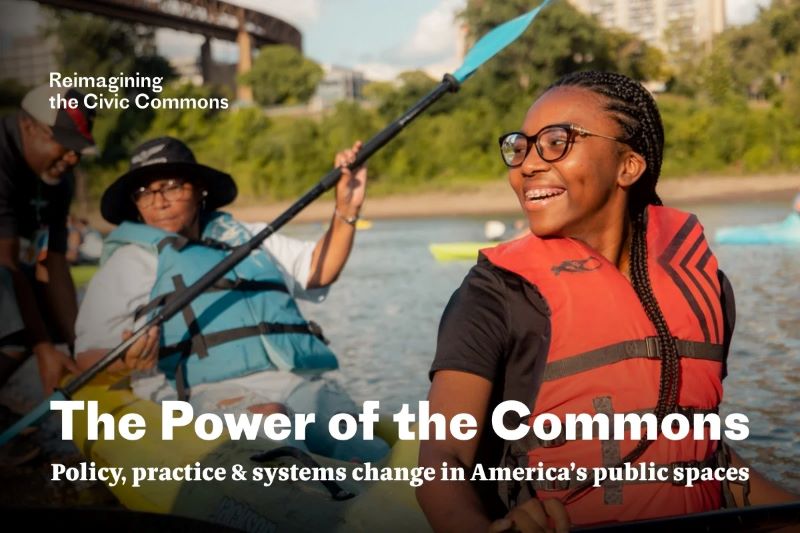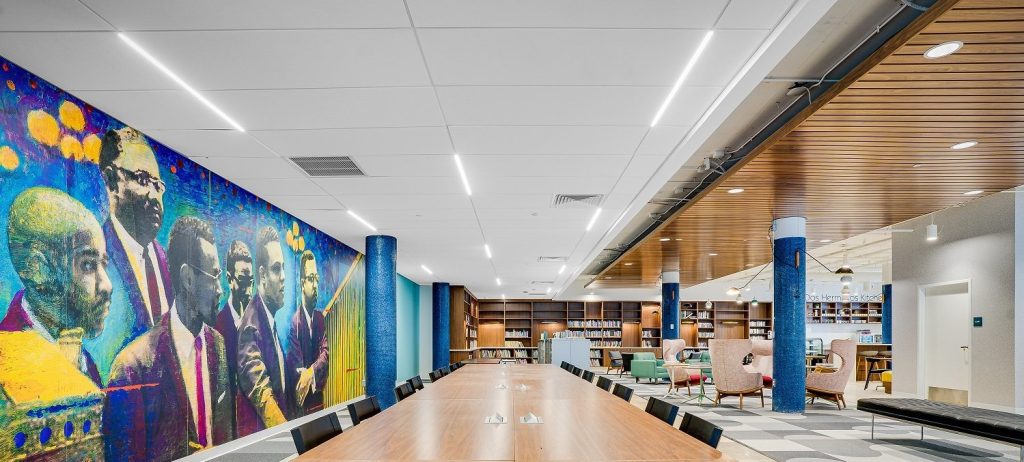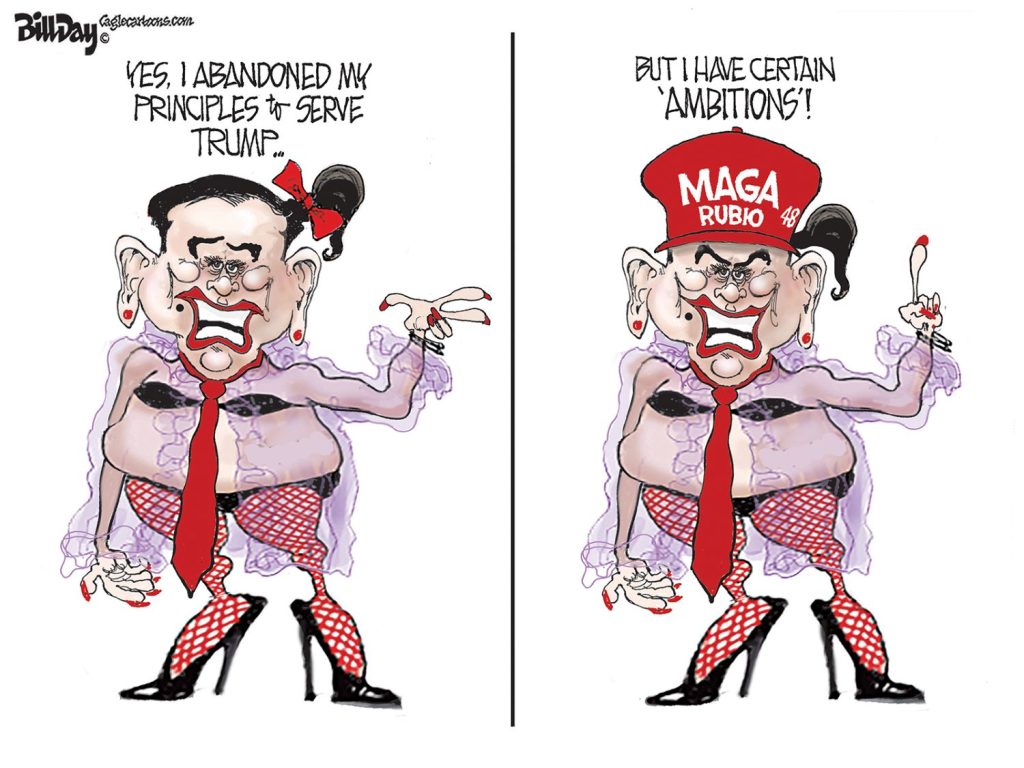Editor’s Note: Carol Coletta earlier this week was presented in a ceremony in Washington, D.C., the American Society of Landscape Architecture’s LaGasse Medal, the highest award presented by ASLA to a non-landscape professional.
**
When Carol Coletta brought Reimagining the Civic Commons to Memphis in 2016, its impact was far greater than the $5 million she brought with her from the program funded by national funders, The JPB Foundation, the John S. and James L. Knight Foundation, The Kresge Foundation, William Penn Foundation.
She was shaping the philosophy and leading the implementation of the $40 million program as senior fellow with the American Cities Practice at the Kresge Foundation. Initial activities include civic education forums, programming for parks friends’ groups, transportation advocacy, a coordinated landscape management plan, and data collection.
The first Civic Commons grant for the Fourth Bluff demonstration from 2016-2019 was $4M with matching funding from Hyde Foundation for the River Line and City TDZ funds for Cossitt Library. The second grant from 2020-2023 was $1M.
This week, the national foundations announced a new $10 million phase of the program and Memphis will receive $390,000 over the next three years to continue and strengthen the Memphis collaborative network, provide capacity to partners, and fund smaller scale demonstration projects and programs so the principles of the program will continue to live beyond the funding and influence civic decision-making.
Equity As the Currency of Change
The program’s aim is “to lift up public space as a solution and influence comprehensive community development and revitalization by demonstrating the value of investing in well designed, managed and programmed public space, deepening civic engagement and advocacy and scaling practices for mixing, management, and maintenance.”
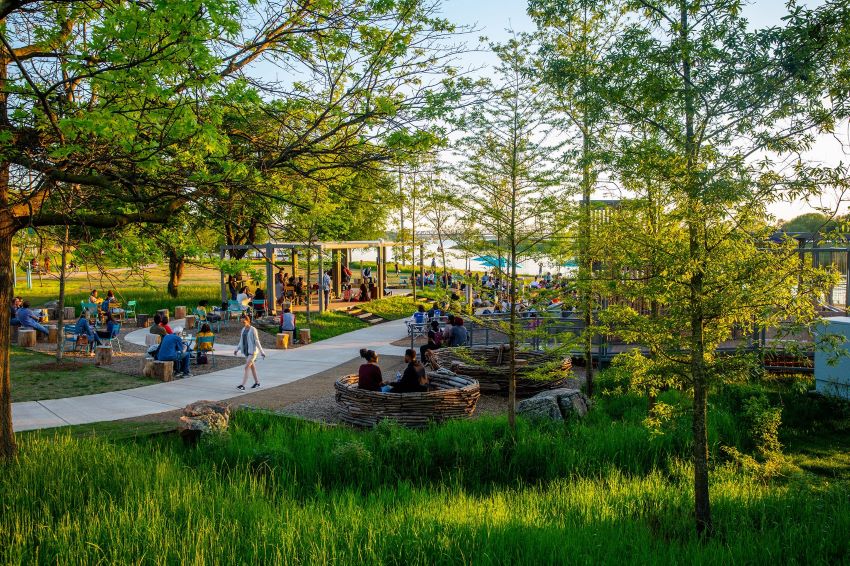 More the point, those words were translated into physical form that are proof positive of the power of a philosophy that sees parks, trails, community centers, libraries, neighborhood main streets, active transportation and public gardens as more than just the obvious, but as vehicles to combat social isolation, build connections across race and geography, and engage in community life.
More the point, those words were translated into physical form that are proof positive of the power of a philosophy that sees parks, trails, community centers, libraries, neighborhood main streets, active transportation and public gardens as more than just the obvious, but as vehicles to combat social isolation, build connections across race and geography, and engage in community life.
In the language of placemaking, Reimagining the Civic Commons is all about civic engagement, socioeconomic mixing, environmentally sustainability, and value creation. But it is also about managing public spaces as a potent portfolio of connected assets rather than individual sites.
“Public spaces become meaningful places from the actions of the people who use them,” the Bloomberg Center for Public Innovation at Johns Hopkins, writing about the Memphis riverfront. “Although public spaces cannot force people to engage with each other, great ones, such as equitably designed and programmed parks, can nudge people toward shared public life. Toward this end, many local communities are aspiring to develop places as common ground that create opportunities for conviviality and social mixing. In the United States, this potential is often hindered by the inequities in access to high-quality public spaces along racial and socioeconomic lines.”
Proof Positive
Reimagining the Civic Commons describes its impact this way: “Founded on the banks of the Mississippi River, Memphis returned to the river in 2016, transforming two parks that previously honored the Confederacy and a historic library into active, creative and inclusive gathering spaces. These successful demonstration projects spurred a larger reimagining of the riverfront, resulting in a park celebrated for its world-class design and impact on downtown economic development.
“Now, these efforts have catalyzed a citywide movement of organizations changing the way they work in service to a shared goal: a vibrant, diverse and unified community through the power of public spaces. A city with a rich history that struggles with racial and economic segregation exacerbated by urban sprawl, Memphis is working to create high-quality common spaces where Memphians come together to shape the city’s future.”
The most dramatic case study of Reimagining the Civic Commons’s principles can be seen in the transformation of the Memphis riverfront in only six years as Ms. Coletta moved from Kresge Foundation to take the helm of Memphis River Parks Partnership in 2017 to create the kind of riverfront that has been a dream in various plans and studies over 100 years.
Today, with five miles of connected river trails, three new parks, and a depth of programming, equity is at the heart of the design and all that is done on the riverfront.
Success is more than one million people visiting Tom Lee Park in the past year with 57% saying they have become acquainted with someone they had not previously known. Two-thirds of visitors to Fourth Bluff Park – now devoid of the Confederate detritus once dominant there – say that have met someone for the first time and 74% say they feel the neighborhood has changed for the better. Meanwhile, more than 5,000 individuals from 27 zip codes participated in yoga classes in River Garden. Historic Cossitt Library now includes a podcasting studio, a chef-driven café, two flexible performance spaces, technology labs, plenty of soft seating, and a prominent mural celebrating our civil rights activists.
Living Life in Public
Most importantly, none of these spaces are now an afterthought in civic thinking. No longer are they thought of narrowly and vertically about their purpose and their work. Rather, with equity as the focus, the context is transformed. It is a focus that ensures that all of Memphis is welcome in its full diversity and that equity is implemented with constant intentionality.
Some Memphians ridiculed and diminished the importance of equity when Reimagining the Civic Commons selected the city as one of the first five cities in the program. That said, equity has attracted national and international attention to what has been accomplished in Memphis – as validated by numerous awards. The work in the city has also attracted groups from other cities and universities who have come to Memphis to learn from what has taken place.
As keynote speaker to Philadelphia’s annual ideas festival, Ms. Coletta explained equity’s importance: “We can invest in equity. And if we do it right, an investment in public space will be an investment in equity…Think about it: walking a trail regularly doesn’t require you to commit your life savings to a down payment in what may turn out to be the ‘wrong’ neighborhood. Using the ‘wrong park’ doesn’t risk your first born failing to get into college.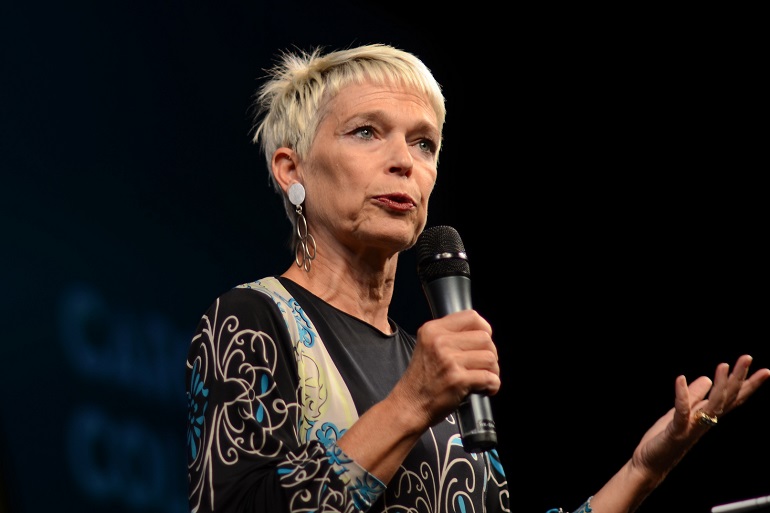 That’s because public space has a low barrier to entry and exit. You can come, you can go. It doesn’t require the commitment of club membership. And even the best public space is cheap compared to the alternative of leaving people in distressed neighborhoods and accepting economic segregation as inevitable.
That’s because public space has a low barrier to entry and exit. You can come, you can go. It doesn’t require the commitment of club membership. And even the best public space is cheap compared to the alternative of leaving people in distressed neighborhoods and accepting economic segregation as inevitable.
“But there’s a catch. Public space is a worthy substitute for our income-segregated neighborhoods and schools only if they manage to attract people across a wide range of incomes to occupy the same space at the same time peacefully, even joyfully. Better still if they nudge people to spend time doing something together — singing, playing, learning. At minimum, good public space shared regularly with strangers — including those who don’t look like you — breeds empathy. Empathy is essential to community, and community is essential to democracy. In the best case scenario, familiar strangers form ‘loose tie networks’ — the ones well-resourced people form in college and careers and use to get jobs, find a spouse, recommend a school, find a place to live.
“Convincing people to ‘live life in public’ is one of the greatest services we can perform for our cities, because parks are not just places to unwind or recreate, (just like downtowns are not simply places to conduct business). They are also deeply necessary platforms for equity. The writer Adam Gopnik described the mixing we need in cities this way: ‘Cities shine by bringing like-minded people in from the hinterland, but they thrive by asking unlike-minded people to live together in the enveloping metropolis. While the clumping is fun, the coexistence is the greater social miracle.’”
Memphis Partners Continue the Work
It’s a lesson for Memphis worth much more than $5 million. That’s because, supported by Reimagining the Civic Commons, a growing network of partner organizations from diverse neighborhoods across Memphis are collaborating to change how they work toward a shared goal: creating a vibrant, unified, and inclusive community through the power of public spaces. Collaborators include Innovate Memphis, City of Memphis Parks, public libraries, and place-based organizations Bloom, The Heights CDC, Memphis River Parks Partnership, and Overton Park Conservancy.
As part of the announcement about this new funding phase of the Reimagining the Civic Commons, a 146-page Metrics Report for Memphis has been issued with a timeline of the program’s ambition and work, public’s opinions, ecological indicators, environmental sustainability, safety, and much more.
Launched in 2016 in five cities – Memphis Chicago, Detroit, Philadelphia and Akron – with an initial $20 million investment. cities receiving funding from this round of investment are Akron, Camden, Cincinnati, Detroit, Lexington, Macon, Memphis, Minneapolis/St. Paul, Philadelphia, and San José.
***
Join me at the Smart City Memphis Facebook page and on Instagram where these blog posts are published along with occasional articles, reports, and commentaries that are relevant to Memphis.

